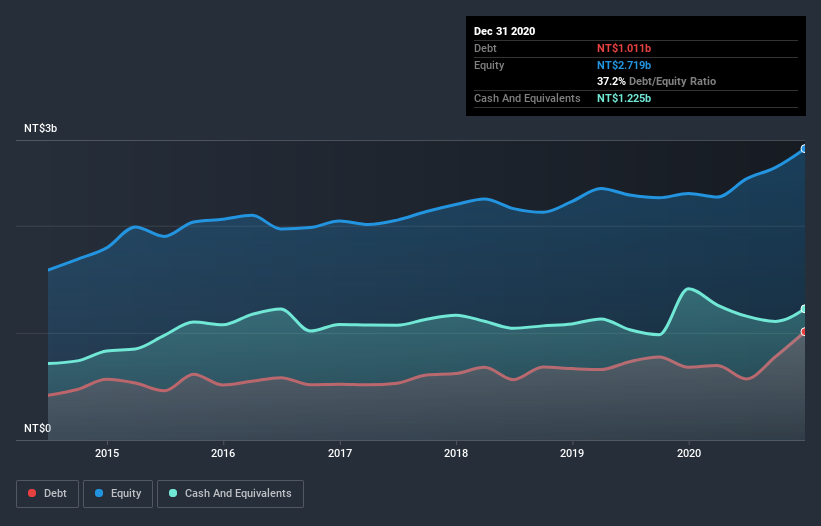- Taiwan
- /
- Auto Components
- /
- TWSE:2115
These 4 Measures Indicate That Luhai Holding (TPE:2115) Is Using Debt Reasonably Well
Some say volatility, rather than debt, is the best way to think about risk as an investor, but Warren Buffett famously said that 'Volatility is far from synonymous with risk.' It's only natural to consider a company's balance sheet when you examine how risky it is, since debt is often involved when a business collapses. Importantly, Luhai Holding Corp. (TPE:2115) does carry debt. But is this debt a concern to shareholders?
What Risk Does Debt Bring?
Debt is a tool to help businesses grow, but if a business is incapable of paying off its lenders, then it exists at their mercy. Part and parcel of capitalism is the process of 'creative destruction' where failed businesses are mercilessly liquidated by their bankers. However, a more frequent (but still costly) occurrence is where a company must issue shares at bargain-basement prices, permanently diluting shareholders, just to shore up its balance sheet. Of course, the upside of debt is that it often represents cheap capital, especially when it replaces dilution in a company with the ability to reinvest at high rates of return. The first thing to do when considering how much debt a business uses is to look at its cash and debt together.
See our latest analysis for Luhai Holding
What Is Luhai Holding's Debt?
You can click the graphic below for the historical numbers, but it shows that as of December 2020 Luhai Holding had NT$1.01b of debt, an increase on NT$678.7m, over one year. However, it does have NT$1.22b in cash offsetting this, leading to net cash of NT$213.7m.

A Look At Luhai Holding's Liabilities
The latest balance sheet data shows that Luhai Holding had liabilities of NT$915.1m due within a year, and liabilities of NT$1.09b falling due after that. Offsetting this, it had NT$1.22b in cash and NT$811.1m in receivables that were due within 12 months. So its total liabilities are just about perfectly matched by its shorter-term, liquid assets.
Having regard to Luhai Holding's size, it seems that its liquid assets are well balanced with its total liabilities. So while it's hard to imagine that the NT$4.67b company is struggling for cash, we still think it's worth monitoring its balance sheet. Simply put, the fact that Luhai Holding has more cash than debt is arguably a good indication that it can manage its debt safely.
Fortunately, Luhai Holding grew its EBIT by 5.0% in the last year, making that debt load look even more manageable. The balance sheet is clearly the area to focus on when you are analysing debt. But it is future earnings, more than anything, that will determine Luhai Holding's ability to maintain a healthy balance sheet going forward. So if you want to see what the professionals think, you might find this free report on analyst profit forecasts to be interesting.
Finally, a company can only pay off debt with cold hard cash, not accounting profits. While Luhai Holding has net cash on its balance sheet, it's still worth taking a look at its ability to convert earnings before interest and tax (EBIT) to free cash flow, to help us understand how quickly it is building (or eroding) that cash balance. Over the last three years, Luhai Holding saw substantial negative free cash flow, in total. While investors are no doubt expecting a reversal of that situation in due course, it clearly does mean its use of debt is more risky.
Summing up
While it is always sensible to investigate a company's debt, in this case Luhai Holding has NT$213.7m in net cash and a decent-looking balance sheet. On top of that, it increased its EBIT by 5.0% in the last twelve months. So we don't have any problem with Luhai Holding's use of debt. When analysing debt levels, the balance sheet is the obvious place to start. But ultimately, every company can contain risks that exist outside of the balance sheet. Be aware that Luhai Holding is showing 2 warning signs in our investment analysis , and 1 of those makes us a bit uncomfortable...
When all is said and done, sometimes its easier to focus on companies that don't even need debt. Readers can access a list of growth stocks with zero net debt 100% free, right now.
If you decide to trade Luhai Holding, use the lowest-cost* platform that is rated #1 Overall by Barron’s, Interactive Brokers. Trade stocks, options, futures, forex, bonds and funds on 135 markets, all from a single integrated account. Promoted
New: AI Stock Screener & Alerts
Our new AI Stock Screener scans the market every day to uncover opportunities.
• Dividend Powerhouses (3%+ Yield)
• Undervalued Small Caps with Insider Buying
• High growth Tech and AI Companies
Or build your own from over 50 metrics.
This article by Simply Wall St is general in nature. It does not constitute a recommendation to buy or sell any stock, and does not take account of your objectives, or your financial situation. We aim to bring you long-term focused analysis driven by fundamental data. Note that our analysis may not factor in the latest price-sensitive company announcements or qualitative material. Simply Wall St has no position in any stocks mentioned.
*Interactive Brokers Rated Lowest Cost Broker by StockBrokers.com Annual Online Review 2020
Have feedback on this article? Concerned about the content? Get in touch with us directly. Alternatively, email editorial-team (at) simplywallst.com.
About TWSE:2115
Luhai Holding
Manufactures and sells tire valves and accessories worldwide.
Excellent balance sheet with proven track record and pays a dividend.
Similar Companies
Market Insights
Community Narratives



